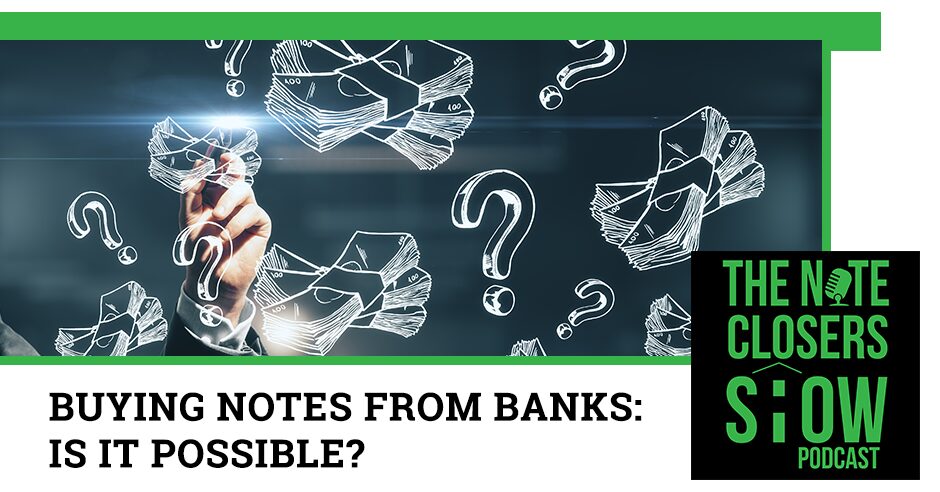
Thinking that you can’t buy notes from banks is a very misconception. It is entirely possible to buy notes from banks as long as you know where to look, who to contact, and how to contact them. In this episode of the Note Closers Show, Scott Carson discusses how to get banks to sell you notes and which banks will and won’t sell one-offs to you. He also lists the different ways to find note deals along with the name of the department that handles debt sales. Tune in for more tips and tricks for the note space here.
—
Watch the episode here
Listen to the podcast here
Buying Notes From Banks: Is It Possible?
I’m going to share with you the ten different ways to find note deals and share with you how to have the bank say yes to you to send you some note deals. Banks will sell you notes if you know what to say, what to do and then also, know how to follow-up the market like it’s the 21st century. Not like it’s the 18th century like a lot of other people are doing incorrectly. Go out, make sure you read the whole show. You’ll love the ten ways I share with you and make sure you like and subscribe.
—
Excited to be here with you. I’ve got a great topic for the show and I bring this topic up every once in a while. I’m always amazed at where people get their information from. I’m also amazed at the dis-information being provided in the note industry. I think part of it comes from a sales tactic to sell more workshops, coaching or stuff like that with other people out there. The fact that I hate to say it but a lot of investors are lazy and don’t want to do work. This topic is all about that banks will sell you notes if you know who to talk to and what to say.
You’re just not going to be able to walk into your local bank and then the VP of the branch follows over with his list of notes that they have available. I say this being a previous banker. For those that don’t know, I’ve been a mortgage banker originating loans all across the country as a mortgage banker. Prior to that, I was also a mortgage banker for Bank One and then JPMorgan & Chase or Chase Bank. I became Vice-President of a local bank.
I helped open twenty branches around Austin, Texas. Chase was one of the top bankers in all of Texas. I had a few people that walked into the bank when I was a banker there and asked me to buy Chase’s notes. I didn’t know it at all. I said, “We don’t sell notes here.” If you just go into your local bank, ask that and you’re dealing with a banker who’s a young guy who went behind the ears, has been there for a while but not a small bank. It’s a national conglomerate like Chase, Citibank, Wells Fargo or big banks like that, they’re going to tell you they don’t sell their notes because they don’t know. I didn’t know.
I was an idiot then. I didn’t know what was going on out here. Don’t take it for granted that you’re probably talking to somebody in the bank. They’re not the right person to talk to you. Even though the bank Presidents, the Regional Managers, a lot of times, District Managers don’t know that the banks will sell their non-performing notes on those bigger banks. This is why we always tell people, “Look at the regional banks, the smaller banks but don’t go to your local bank. Don’t waste your time going in and talking to your local banker, opening your checking or savings account or giving you a loan on the property. They don’t know.” I will make one exception and ask who made the loan.
If you’re dealing with a smaller bank, I’ll say less than say 20 or 10 branches, a lot of cases or it’s a one-off branch specifically. The person who made the loan may be the loan officer may be the person servicing the loan, maybe the person who’s responsible for it. We’ve seen that in small one-off banks. We’ve seen that in smaller branches, usually five branches less, where the person making the loan is the one responsible.
Passing The Smell Test
They may not that note at a big discount or discount, all because the bank may be able not to take that financially as a hit to their bottom line. I get plenty of bankers that have reached out to me. I bought plenty of notes direct from banks for several years that sold to me, never asked me, proof of funds, never asked me a variety of different questions. “What’s your credit score.” I knew what to say. I knew what not to say. I act the part I provided. I looked good online. With a website and experience, I knew what I was talking about and that worked. That’s one of the biggest things that most people don’t understand.
If you pass the smell test, you can often get stuff if you know what to say or what not to say with no experience and that’s the people think you have vendors that can help you with your deal flow. You’ve got vendors that are going to help do all the heavy lifting. You’ve got to train a servicing company. That checks off roughly 2/3 of the conversation that you’re not going to be an embarrassment if the bank sells you one of them.
There are people out there outside of Texas and in Texas, that’s saying, “You aren’t big enough. The bank isn’t going to sell to you because you don’t know shit.” You’re not big enough. They’re not going to deal with little owe to you. That’s not the truth. That is so far from the fact of the matter that the true thing is these banks will sell you notes. They will sell you some off notes in cases.
You’re not going to call Bank of America, Chase Citibank, Wells Fargo if the biggest banks aren’t going to sell you a one-off residential note. Not going to happen. They may sell you a commercial note. Am I selling you a one-off note on a distressed commercial asset? That has to happen. We’ve seen bought assets from Wells Fargo, Citi, Chase, US banks even looked at some Bank of America commercial notes in the past that they were selling.

Notes From Banks: Most of the time, banks want a very clean transaction. When it comes to closing them, it means one wire on the day of closing.
You have to know who to talk to and who not to talk to. Here’s the big thing. I don’t care if you’re working as a full-time non-note investor and your side hustle is note investing. That’s totally fine. Banks will sell it to you if A) You have cash and B) You don’t want to act in embarrassment to them. You’ve got the vendors, the servicing and you can fund.
Banks aren’t going to ask for earnest money most of the time. You’re buying a one-off note once it’s a larger trade then they may ask for a deposit of some sort. Most of the time, banks want a very clean transaction when it comes to closing. It may mean one wire on the day of closing. First of all, let’s get some ideas out of the way there, let’s get some falsehoods out of the way.
I think the first one banks will sell you to notes. That’s the first one. Anybody tells you that if they won’t that either A) Aren’t doing it, they aren’t in the note business or B) They’re trying to sell you on their coaching, that you have to go through them. It is what it is. I don’t necessarily agree with that but I will tell you now when we teach people how to do it, we teach them how to fish so that I don’t have to give them fish every day.
They should go out and find deals themselves. We have a variety of individuals calling banks, calling servicing companies and getting lists sent to us, getting their contact information to follow-up with once ever COVID finishes whether it’s the end of this month, October, January, whenever it ends, banks are going to be looking to move.
Know Your Asset Classes
We were already having these conversations. We were having these conversations prior to COVID from different banks across the country who were looking to move individual assets. The biggest thing that is affecting the banks now is not the residential loans. Those are originated but their government-insured the government back. They’re not going to take a big loss on those at all. You’re not going to buy much of that stuff.
What you’re going to see and what’s clogging up most of the bank’s books now are that small-balance commercial that sub $5 million above a commercial asset. The thing about commercial assets, it’s not the same type of underwriting, it’s not the same type of due diligence for a commercial loan as it is for a residential loan. First and foremost, a residential loan a bank is going to be financing that probably 90% or greater on a primary residence.
If it’s an investment property, they may go to 70% or greater, depending on what platforms or lending opportunities they have. In a commercial deal, the banks will only probably finance up to 70%, maybe 80% of that transaction. Any of that percent of the purchase price, where they prefer to be below 70%. What has happened over the last few years is that more of that small-balance commercial has been financed by local banks, not Wall Street.
Wall Street likes the big $5 million above assets. That’s where they play. That’s where they make their money. What does that mean for us? It means there’s a huge amount of deal flow. If you know your commercial assets, if you know asset classes, assets in an area, you need to know this on a city-by-city asset class by asset class basis.
Every asset class has a different way of determining value. You’ve got to figure the net operating income. You got to figure the cap rates. Is it occupied? Is it as banking? There’s a lot more stuff versus just checking, “What’s the rent rate? What’s the BPO? What’s Zillow. Tell me the value is it the once we’re coming or tell me the rent rate is.” You need to know the market, what’s going on in that state, on their asset, with those tenants in a variety of fashions. I’m separating off apartments from other types of commercial because apartments, you can do relatively easily. What are the rent rates on these? Is it individually metered? What are the expense ratios and that stuff?
Reaching Out To The Right People
What’s the rent look like? Have the rents rate been up? You have rate in holiday in line with the market. It’s a little bit easier on the apartment side to pull due diligence than it is on a strip mall, in a restaurant, a vacant storage facility, whatever it might be. You need to know the asset class. Here’s the thing, banks will sell you notes. How do you get them to say yes to you? That’s the million-dollar question. “How do you get a bank to say yes versus no?” First and foremost, you have to reach the right department.
The right department is going to vary by the name of the class. You’re going to go walk into the bank. We know that for sure you and I have talked to the teller, drive-through and I can talk to the VP of the bank. I was a VP of a bank. Banks give out the title of VP of anybody that’s technically, I won’t say above a teller but above a personal banker, for the most part. VPs will be your bank manager, regional manager, your commercial, residential and stuff like that, the main titles you’re going to go for.
First of all, you’re not walking a local bank. You want to call the bank’s corporate offices. Whatever the bank name is, we want to reach out to either state corporate or the regional corporate office or their national corporate office. How do you find that number? It’s hard sometimes. It’s not calling 1-800 or the customer service line. That’s a dead-end for you. Most of the banks will have the main office number or they’ll have a couple of departments that you can reach out to.

Notes From Banks: Banks will sell you one-off notes If you know who to talk to, where to look, and how to contact them.
The first department from the bigger banks, we often see a Special Assets Department, not assets but Special Assets Department. We also will find people online that work at specific banks who have the job title by going to LinkedIn and doing a search for Special Assets Manager. When you’re calling the corporate office for a bigger bank, say, “I’m looking for your Special Assets Department, trying to track down your Special Asset Managers. It’s often nice if you leverage LinkedIn before making in the dial for dollars by looking for a person who has that title in that bank.
Some of them are going to be active on LinkedIn. Others that have been around the older crowd, more gray hair, probably aren’t going to be on LinkedIn a lot of times and they may have a profile but they may not be very active. Looking at profiles on LinkedIn is great as long as they’ve got a face, a picture and connections.
If you see an empty gray slot where a photo should be in less than 500 connections, they’re probably not active on LinkedIn but at least you have a name or a pass name that you can reach out to when you call it corporate office, you can hold the special assets department. The first title is special assets department. The second title is the secondary marketing department. It is another title for the bigger banks and regional banks out there. They’re looking to move those assets off on the secondary market Wall Street mainstream investors like you and me.
Looking for secondary marketing, you’ll see that a lot of hedge funds or REITs will have a secondary marketing department where some of the larger net funds have bought a portfolio. They’re looking to move it back out to the market whether it was a non-performing or this not reperforming, they’re looking to recapitalize at a profit, increase the velocity of capital or they bought some performance of this non-performing that they want to get off the books. Secondary marketing is the second one.
The third one is going to be your Chief Credit Risk Officer. This is going to get into your smaller regional bank, statewide bank, stuff like that. We’ll also look on LinkedIn for Chief Credit Risk Officer for banks for also secondary marketing department. The final name you’ll see that with a lot of insurance companies or bigger trends, whole loan trading department, the whole loan trading desk is a pretty good response.
It’s a pretty good way to go but you’re often going to find some portfolios that they’re looking to move. They may not be looking to sell a one-off note and a whole trading officer. We’ve seen that title across different institutions out there. Those are always the four biggest names to look for. LinkedIn is a great resource. LaneGuide.com we’ve used for years. Lane Guide might be a little bit outdated but I would still say that it’s 2/3 of the contacts on there are good. Lane Guide will allow you to do some searches that are easy to do pull lists as a matter of doing what most people don’t want to do. What do I mean by that? People, we all know are inherently lazy. Look at what’s going on in the economy out there. People are making more on unemployment.
They don’t want to go back to jobs. They don’t want to go to work. They’re lazy. Work is a four-letter word for most people. Unfortunately for most real estate entrepreneurs work is not something that they want to do by work. By work, I don’t mean going out and digging ditches, paint walls or rehabbing properties.
This is the 21st mindset way of doing work and that’s marketing, “What? Do you mean I just don’t have a name here? They were not going to send me a list?” No, you’ve got to market to asset managers. You’ve got to market to the whole one trading desk whether that’s jumping on LinkedIn and connecting, find in an email, send an email blast or picking up the phone and dialing for dollars. We’re all in sales, we’re all in media but we’re also still all in sales if you’re looking for deals.
I know it can be frustrating. “I got to make 50 phone calls to get one 1 list or 2 lists.” It all comes down to what you’re saying too. There are specific things you want to say and you don’t want to say. You never want anyone to mention the word REO. A lot of people were like, “I’ll look it for notes and REOs.” No, don’t say that. That’ll just turn you off to the corporate office. They’ll just send you to the REO department, which is a voicemail box that says, “Call you the agent, the listing agent on it.” Don’t mention REOs. You also never want to say that you’re representing a buyer. They don’t need reps. They don’t need buyer reps. They don’t need buyer mandates. That’s a bunch of bullshit anyway.
They want to be dealing with direct buyers. You and I are always buying for our own portfolio, even for looking to wholesale, that deal later on or that’s our strategy is wholesaling versus taking it down our sales. You’re always still buying for your own portfolio. You may even want to repeat that, “I’m buying for my own portfolio.” Say it a few times. Ingrain it in, “Scott, I don’t have the money to buy a $5 million commercial asset? What the heck am I going to do? I don’t want to do this. What? They’re going to send me some stuff that I don’t want to do.” The idea here is to chill. You don’t have to say. they’re not asking for your firstborn, your right arm or your left arm in some cases.
We all know that banks and institutions or investors were raising capital if they fund it. It’s a process. It’s not closed on it in a week. Especially in commercial assets, you may get 60 to 90 days of due diligence to close on a deal. It may take some time for them to go back and forth and pull the information that they need.

Notes From Banks: Every asset class has a different way of determining value.
What you have to realize if a commercial asset is non-performing, that means the banks, probably not getting the financials or not getting a lot of the information. It takes a little while to go through that. What’s unique about commercial assets is if you take the time and become Sherlock Holmes is what I like to joke about when it comes to commercial assets, you may have to do your own due diligence on the assets to figure out what’s going on.
Why Deal With Banks?
You may know more about that asset than the banknotes. Why do I like dealing with banks directly? Banks, if they’ve got the information, they’re going to share it with you because they were going to do full disclosure versus dealing with a website, going through a third party or a broker. My big frustration is dealing with real estate agents who have a connection with a bank and trying to sell commercial assets but they’re screwing up the shit more than they’re providing value. If they would just sign their fee agreement and step aside between the people that are trying to buy and the people they’re trying to sell, it will be a whole lot easier, we’ve had plenty of realtors. I hate to say attorneys screw you up more than they add value in some cases.
Anyway, let me digress and go back. You want to be specific in communicating what you’re looking for. I’m looking for non-performing residential loans or non-performing commercial loans. First liens, you’re not going to see a lot of junior liens out there. Sorry about that. The beauty of buying direct from banks is you’re not dropping thousands of thousands of dollars on postcards like you would as a traditional investor, sending out to out-of-state owners or things that. We don’t do that in the note space.
You’re sending an email blast. You can spend some money on having an email service provider like MailChimp or our forensic Keap.com or something that you send out to track your emails. You may be using may want to upgrade to the $99 Premiere special on LinkedIn so you can send more InMails.
You may make more phone calls directly to asset managers. You might take some phone calls and follow-up because we all know 80% of sales come after the fifth contact. If you can follow with an email or a phone call and LinkedIn and repeat that process a couple of times, it’s just a matter of following up with everybody to see what’s going on.
Keeping Your Eyes Open
Make sure you’re getting inside the inbox, the phone call or just on LinkedIn with people saying, “What do you have now?” Not every bank has something available this quarter or this month. A lot of banks will have to save money in building the reserves up to offset the losses on selling notes at a discount. You can always look at the quarterly bank reports by going to FDIC.gov and seeing if a bank is starting to increase the reserves. It’s the right tool for that.
You can also look at one of our favorite sources is about Bauer Financial. It’s not named after Donna Bauer. Bauer Financial is a third-party, independent class ranking company that ranks banks and credit unions and where they’re at but you can buy a list off of Bauer Financial. They will show you what percentage of the bank’s portfolios and default where there’s residential commercial, dollar amount and percentage of the over banks values and stuff that, which gives you a good idea if they’ve got anything that’s non-performing.
It’s almost a roadmap to success. You just got to follow that list and then go from there. Anyway, that’s a great starting point going there pulling Bauer Financial list or going to FDIC.gov and looking for the most recent quarterly filing for that institution at a bank. Going from there, “I see you’ve got stuff this quarter, this next month or you had stuff this much in non-performing or 30 to 89 days list last quarter. How much of that is rolled into non-performing this quarter? What are you looking to move the end of this quarter or the end of this month, this year?” Keep that in mind.
Here’s the thing that frustrates a lot of people is that they can’t make just 20 phone calls and get 20 deals sent to them. You have to realize that there is a certain, I’d say, gamification or numbers that you got to follow. You make 50 phone calls. You’ll probably talk to 14 to 20 bankers and you’ll probably get 1 to 4 listings. That list will vary. You have a lot of asset managers selling what’s called S&D or Scratch and Dent Loans. That’s where a bar may be late. They may be in the forbearance agreement. They may be missing some documents from the closing, maybe in truth in lending or good faith estimates.
Sometimes there may be something wrong with the paperwork but the loan may still be good. You also may have a lot of newly originated stuff at low-interest rates that aren’t worth your time to look at it. There’s a loan at 2%. It’s hard for you to make any money on that. Unless they’re going to take a $0.25 on a dollar to get it to 8% return if it’s scratch and dent.
Notes, Forbearance, And Foreclosures
The bank is just not going to take that big a loss. You got to look at, I almost want to say that the objective when you’re buying notes first and foremost is always getting people, try to get them to back on track and re-performing. If they have made a payment 6 or 12 months if they haven’t gone through a forbearance agreement like what’s been offered up across the country COVID, then you need to look to foreclose.
It is where you’re going to see probably the biggest bang for your buck now especially as the interest rates are low. Does it make sense to modify reinstate somebody if you’ve got to pay still $0.70 on the dollar for a non-performer? It just doesn’t make sense. You’re going to see a bigger bang for the buck when it comes to foreclosures, deeds in lieu of the higher value assets.

Notes From Banks: Attorneys screw things up more than they actually add value in some cases.
I’m talking to assets that usually are valued at over $200,000 or more. You can make some money on reperformers at lower values. You just got to know what the cost of your money is if you’re using your own funds or somebody else’s and what’s that going to cost you if you’ve got to split the cashflow coming in for a reperformer. Take a look at that and understand it. This is why marketing is so important. The same tools that you’re using to reach out to asset managers off of lists that you’ve built are the same tools that you’re going to use to raise capital, to make things happen.
We’ve had plenty of banks, plenty of hedge funds do deals with us that we’re talking about. We’re not talking $5 million, $2 million or $1 million dollars. Plenty of funds have close to all those deals that were $25,000, $50,000, $100,000 as well. The question you asked me now is, “Scott, how do you find those funds?” That’s the next step. Besides bank selling your notes, we’ll reach out to them on a regular basis and follow-up.
That’s the key that most of these bankers don’t have a list that they’re sending out on a regular basis. They don’t have those types of tools we do with MailChimp, Keap or something that. They may have a shortlist. The more you can follow-up with asset managers of banks, the more likely you’re going to get something if you just continued to follow-up.
Systematizing your marketing can be very valuable. What you have to realize is that sometimes your systems and your email campaigns the simpler, the better if they don’t get caught by spam filters at banks. A lot of these banking institutions have a very in-depth spam filter to avoid crap coming in and them getting taken over by digital terrorists like we’ve seen in some of the corporations happening out there.
Anyway, other ways to find note deals simply we talked about LaneGuide, we’ve talked about the FDIC.gov list. You may want to look at ScotsmanGuide.com. It is a great place to find lenders that are lending on residential and commercial properties. The same thing if they’re lending on those types of properties now, a lot of them especially the commercial side is going to be portfolio lenders that have held on to the loans that may be non-performing.
If they’re originating loans, they probably may have some stuff on their books. We use Scotsman Guide to find commercial lenders and specific asset classes that may have some stuff on the books that’s been profitable and fruitful in the past and continues to be. Another thing you may want to look at, I like to track a couple of counties across the country by literally going to the county clerk’s office online through NETROnline.com and going to the county recorder’s office and seeing who’s buying assignment. What assignment of mortgages has been filed? If you’ve never bought a note before, an assignment of mortgage is what transfers the ownership. It’s not a deed. The borrower’s name on the property, John Smith is still John Smith if the note is sold.
They have what’s called an assignment of mortgage saying, “this note has been transferred from Chase to ABC Lending.” The thing that I like looking at is looking at assignments that have been filed in the last 30, 60, 90 days. A lot of times transferred to also go back in 2019 or in 2020 and look at what transferred a year ago because you got to think about what’s going on now.
In 2020 people were still in that process of figuring out what they were going to do with forbearance agreements, stuff like that. I like looking at the names, the entities and you pretty easy to search for assignments across most county clerks. That gives you the institution that either originated or owned the note. The new institution that bought that transferred the note to. You may find 5,000, 10,000, 15,000 assignments, individual names.
That’s what we’ve seen in Harris County. It’s one of the counties that we tracked that’s the biggest county in the state. It gives us a lot of LLCs and entities. Those LLCs that are being transferred to are note investors like you and me. That’s another source of note deals. This is contacting note buyers, looking at the assignment of mortgages who bought the note and maybe they have more of their portfolio.
Also looking back in the past, one of the things that we’ve done is looking at a contract for deeds, which are in the smaller value, that’s sub $100,000 value. Looking at Ohio, Michigan, Indiana, Illinois, Carolina’s for contract for deeds and then looking for 1, 2 or 3 of the biggest contract for deed originators back a few years ago by searching for that entity and then looking to see who they sold that deed to, who the deed transfer was.
Looking at Harbour Portfolio in Ohio and the biggest counties doing a search for all 2017, 2018, you’ll see that they transferred it from Harbour to Greystone, Harbour to Ohio Opportunity Fund, Ohio to Inverse Asset Fund to whatever the entity might be. Contacting those individual investors that bought that contract for deed because they probably have some stuff on their portfolio has been fruitful as well.
That’s a couple of ways to do that. You can also if you want to jump on some of the list platforms. I’m not a fan of some of the alone platforms now, just because of the fact that so over picked and you have these one platforms, I hate to say this, don’t really govern their listings that well. They slap stuff up on the wall and try to get somebody to buy something.

Notes From Banks: Work is a four-letter word for most people. And unfortunately for most real estate entrepreneurs, work is not something that they want to do.
They’re not underwriting the deal. If people are putting deals on there that they want a non-performing note at $0.90 on the dollar, that doesn’t make any sense a lot of times. Performing notes that are at 5%, that’s great. It’s watered down a lot of the platforms out there because that’s just shit. When you start seeing those platform owners that have their own notes, trying to sell them on other platforms or through other brokers, it tells you that their platform is just not successful and not worth wasting the time. I did a Note Night in America episode on helping people fund their first deal. I was just disappointed about what I saw. I was able to find some deals but I had to go through a whole lot of crap to find a deal that would make sense or two.
It was downright depressing. We talked about deed records, talk about loan platforms, Scotsman guide, LinkedIn, foreclosure lists. I almost forgot about this. Foreclosure lists are a great way to find distress notes. You may be asking, “Scott, you can’t foreclose now. You can’t evict.” I know that but you can also see if you’re, especially looking for owner finance notes and maybe somebody would take a discount, a lot of people have owner-financed properties to LLCs, to investors and stuff like that. That’s what you see pop up now. You don’t see a lot of owner-occupants getting foreclosed out on it. It’s more investor loans and second loans. Hard money lenders, the right way to deal with a higher yield on that stuff.
Go look at your foreclosure list in particular states and start the foreclosure process. It’s the same thing. You’ll see who the lender is. You’ll often see who the LLC of the individual was. Kudos if you find a self-directed IRA investor, who’s foreclosing on somebody that they make money on-off. That’s an investor-style loan. There’s never going to be occupied for the most part, that looks to me stupid but that’s a great way.
Find Not only note deals but also find potential funding partners who have funded a note deal that probably has some money that they’d be willing to invest. May be willing to transfer ownership, that loan or why you have taken over. Borrower won’t walk away they may be willing to finance that note to you. It’s a double whammy, a double bonus.
They’re not only finding a non-performing note deal but also finding an investor who understands note investing. Who’s lent money on a note, who may be willing to put some money to work if you’re doing. That’s the thing. Basically, ten ways besides using Lane Guide, define a list, Scotsman Guide, finding other lists, jumping on LinkedIn to find the right person looking at the assignment of the mortgage to the counties, the deed records as well, the loan platforms. Other investors, we talked about. This last thing that you could look at would be servicing companies.
There are a lot of servicing companies. In Texas Alone there are 300 plus servicing companies from all across the country that is doing business in Texas and servicing loans. That’s a different conversation. You’d want to contact somebody in their business development office or the servicing companies who know their clients. The business development people are going out and soliciting investors like me and others out there and aid to bring their loans over so they can serve some with Madison Management, Allied or Halo, whoever providing them up that are out there.
Servicing Companies And You
Making contact with a business development person at the servicing company is valuable. You just want to make sure and follow-up with them on a regular basis. The idea here isn’t that you’re taking money away from them. If you move loans off of one servicer to a different servicer, that business development guy or gal is going to lose some money. They’re usually paid a portion of their salary or income is off of how many loans they bring over.
Moving them over from one service or another can affect their bottom line. The more we’re starting to see is servicing comes and gets larger. They start putting a minimum amount of loans to service or minimum purchase, not BSI Financial. They’re a servicing company. They want a $5,000 minimum a month cost to give you. If you only have one loan, you’re not paying $100 servicing. You’re paying $5,000 for that one loan. That doesn’t make a lot of sense.
Keep that in mind when it comes down to some things but servicing companies can be a great way. Once again, it’s a dollar-for-dollar, pick-up the phone, email, LinkedIn aspect of things, that’s one of the most important things we talked about. You got to have a marketing mindset. Banks will sell you one-off notes if he knows who to talk to, where to look and how to contact them. Don’t just say, “Dial ten phone calls and give up.”
I see that happening all the time, “I’m going to make 10 or 15 phone calls and then I’m not going to call anymore because it doesn’t work.” It works. It’s just like any type of Legion, you’ve got to stick with it. I’ve always thought when you compare mailing out 5,000 postcards, it’ll cost you $2,500, the postage alone or other things compared to making 500 phone calls over a week or over two weeks, what’s going to have the biggest bang for your buck.
I guarantee you, 500 phone calls over two weeks will be a whole lot cheaper, more affordable and you’ll find more deals versus dropping out $5,000 postcards where you might get one, 4% response rate. You still only deal in 1 deal, 1 borrower and you still got to do it every month. Whereas lets you build a banking list or list of asset managers that have some available, they will feed you on a quarterly sometimes monthly basis or refer to other things out there.
Banks will sell you notes if you know who to talk to, what to say, what not to say no and how to follow-up and market like you’re in this business long-term. Don’t be a pretender. Don’t be stupid, “It doesn’t work. They won’t sell to you.” Bullshit, they will. I got all the NDAs and the banks that we’ve closed deals from over many years to prove otherwise. Go out, take action. Be safe out there. We look forward to seeing you at the top.

